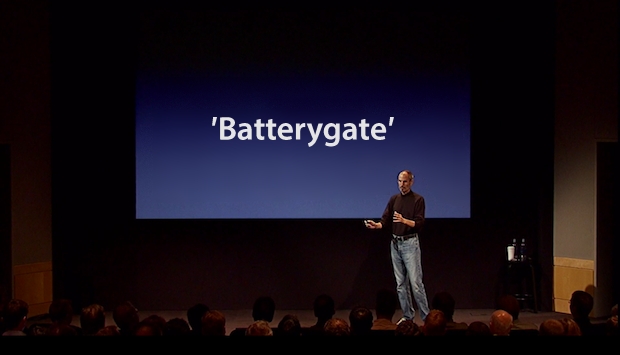'Batterygate': Apple's deathly silence, more transparency needed?

Last night, Apple broke radio silence and admitted there was a battery-related fault with iOS 5, the company's latest mobile operating system.
But in comparison, while 'Antennagate' may have been a storm in a teacup, 'Batterygate' is only reminiscent of, rather than directly comparable to. Many Apple fans, consumers and end-users remain frustrated, and patience is beginning to wain as the company maintained its wall of silence.

To repeat what I said earlier this week, how Apple and Steve Jobs personally handled 'Antennagate' showed more about the elusive company than any other speech, action or product release in recent times. It publicly outed its disaster recovery plan, and the company showed its weaknesses.
Jobs took to the stage to greet press within a fortnight of the iPhone 4 release, and only days after 'Antennagate' perpetuated into near-widespread hysteria. The media were, on the most part, guilty of this. An explanation was given, after a short wall of silence from the company, but an overwhelming majority felt that the solution it had given its customers was a satisfactory one.
But by allowing the company to bleed, so to speak, Apple healed stronger.
Apple, once again, reaffirmed its "love for its customers". No other company can rightfully command this respect from its smartphone or tablet using flock.
But three weeks since the iPhone 4S launch, and the general availability of iOS 5, the mysterious battery bug has left customers questioning where their mothership has gone. After weeks of silent denial, it appeared to make a strategically timed statement last night.
As a swan drifts and glides along the surface of the river, its legs are frantically thrashing under the water. Apple may have ignored its customers, but it has not ignored their cries.
iOS 5 users continue to flood the Apple support communities with cries for help, showing disenchantment and frustration:
"I just got a new iPhone 4S after having my old 3GS for over 2 years. I truly believed that the battery life was going to make a real difference with the new phone. Absolutely not! It is the same or a little worse than the 2 year old phone. I am really annoyed with the new phone."
And others:
"Why don't they offer the option to downgrade to ios4? APPLE GIVE ME MY PHONE BACK!!!!!"
Dissecting the forums and views from users, some are reaching out directly to Apple whilst others offer peer-support.
Within a week of 'Antennagate' becoming talk of the town, Apple had to contend with the "accusations", while the company "wanted to find out the truth", as Jobs said in an interview with AllThingsD earlier this year.
It wasn't ignoring the issue. The company was working behind the scenes to get things right -- at least, get things right based on what Apple's ethos and beliefs would allow it to. Instead of firing out a press release every other day to say, "We're still working on this", and cluttering the newswires with prolonged words that over time simply grate on the customer, it gathered its collective thoughts and only commented when it felt it was right to.
But because of Apple's corporate secrecy, one has to wonder whether its trademark silence is damaging its reputation, by focusing on the 'wrong' self-image issue.
Either, Apple can uncharacteristically speak out and admit that something was wrong -- as was seen in 'Antennagate', or the company can remain silent, issue a short statement to one news publication as it did last night, and hope that it will suffice.
In the case of Apple's location-tracking issue, the company rolled out a fix within two weeks, and while remained relatively tight-lipped about the alleged 'bug', it highlighted it and moved on.
Historically, Apple has been slightly slower to the party than on previous occasions. But nevertheless, it has said what it needs to in a short, sharp burst of public relations -- a rare move to give an unscheduled media response -- to appease the masses at least on a short-term basis.
Ultimately, it boils down to: should Apple have acknowledged the battery bug a week ago? Frankly, I don't think it matters. Timing may be everything, and waiting for a diagnosis is often harder than the treatment itself. But the company has said what it needs to now, and retrospectively 'Batterygate' will be nothing short of a blip on Apple's timeline.
Suffice to say, transparency would have been nice. But Apple, unlike others, remains 'royal' in its stance: dignified, to the point, and moves on from controversy swiftly and quietly.
Related: